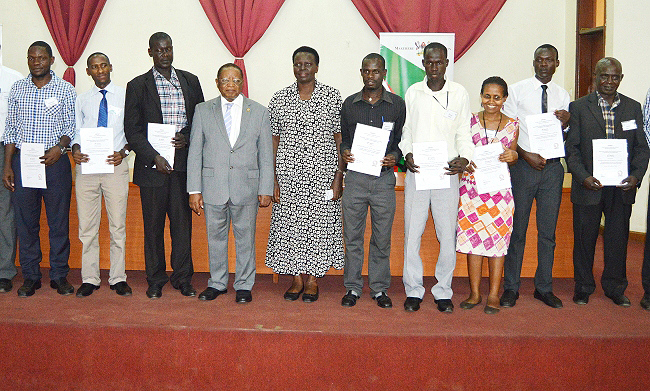The Director for Education Standards in the Ministry of Education and Sports Dr. Kedress Turyagyenda, has urged mathematics teachers and trainers to adopt the recently developed technologies of teaching to enhance students’ abilities of learning mathematics. This was at the closing ceremony of the 10 days residential training of primary and secondary Mathematics teachers from Uganda, Rwanda, Kenya and Tanzania; held on 11th January 2019 at Makerere University.
The 10-day residential course that officially kicked off on 2nd and ended on 11th January 2019, was conducted by the African Institute for Mathematical Sciences (AIMSSEC). Organized and funded by Dr. Margaret Babirye Lwebuga Project in partnership with Makerere University, the training will be followed by a 3-months distance learning course that will introduce participants to a teaching methodology that prepares young people with the knowledge, understanding and skills needed to thrive in the 21st century.
The training will also support and empower teachers who are working in remote rural areas and schools in disadvantaged communities, and give them free teaching resources that they can share with other teachers.

Representing Mr. Alex Kakooza, the Permanent Secretary Ministry of Education and Sports, Dr. Kedress Turyagyenda encouraged teachers to identify and understand the potential gaps that exist in the field of Science, Technology, Engineering and Mathematics (STEM) for their students to understand the modern mathematical context.
“Pupils should be given the opportunities to apply skills, knowledge and understanding from the programmes of study of other subjects. With the modern skills, knowledge and equipment you have obtained through this program, go back and be practical. Apply the principal of excellence. Whatever your task is at work, do it with all your heart and be faithful to your work,” she said.
She commended the teachers for dedicating their time to not only develop their professions but also change the lives of million pupils in the region. “Technology is evolving so fast, we therefore need to equip ourselves with the needed knowledge and skill to meet the required 21st century demands. In life there is need to learn, unlearn and relearn. Science and technologies are the key pillars of our education system and the purpose is to give every child these pillars,” she said.

She commended Dr. Margaret Babirye Lwebuga, Dr. Marjorie Batchelor and the families when she said, “through your generous support, you are professionally developing the mathematics sector of Uganda and the region.”
In the same spirit, she appreciated the trainers for dedicating their life and finances to impact millions of children by training their teachers.
Dr. Turyagyenda acknowledged the government’s efforts to improve the science teaching and learning environment in the country.

“The vision of Ministry of Education and Sports is to provide Quality and appropriate Education and Sports services, for all. It is against this vision that Uganda became the first country to implement Universal Primary Education and Universal Secondary Education. We believe that every child matter and can survive if given a suitable environment where he/she is appreciated and given equal opportunities,” said the Director
According to the Chancellor of Makerere University Prof. Ezra Suruma, a solid foundation in mathematics is an essential skill for students. To him, Mathematics is the ‘queen of science and the language of nature’.
“ On many occasions, mathematics as a subject has been considered to be very difficult. I would say, mathematics is an essential subject everyone in school must take,” he said.

“Nevertheless, mathematics is so essential to other disciplines such as economics, social sciences, and humanities hence being called ‘the universal language’. As a Professor of Economics, I have interfaced with so many areas in my field that need the mathematical knowledge,” the Chancellor added.
He thanked participants for dedicating time to attend the intensive residential course and also appreciated the trainers for investing in an African child. “When engaging in such programs we should also be sure that the multiplier effect of training trainers is very important,” he stated.
Toni Beardon, the Founder and Chairperson of the African Institute for Mathematical Sciences (AIMSSEC) expressed the team’s commitment to eradicate poverty by providing better education services to African children.

Participants were presented with certificates of completion of the course. On the same occasion Dr. Margaret Babirye Lwebuga was honored for her tremendous support towards the development Uganda’s education sector.
In an exclusive interview with the Makerere University Public Relations team, the Head, Department of Agricultural and Bio Systems Engineering at Makerere University Prof. Noble Banadda, spoke about Dr. Margaret Babirye Lwebuga as an exceptional lady with a generous heart. Through her profession path as a mathematics teacher, Dr. Margaret Babirye Lwebuga has embarked on improving the quality of teaching and learning of mathematics in Uganda and East Africa at large.
On behalf of the participants Ms. Mirembe Agnes a secondary school Mathematics teacher thanked Dr. Margaret Babirye Lwebuga and the team from the African Institute for Mathematical Sciences (AIMSSEC) for the constructive knowledge. According to Ms. Mirembe, participants were introduced to ways of improving the quality of teaching mathematics, developing the pedagogical training for mathematics learners and ways of accessing modern teaching equipment.

“All participants have been enrolled to AIMSSEC platforms to access modern teaching equipment and software to teach mathematics in an interesting way. We promise to put what you have taught us into practice,” she said.
AIMSSEC is the Schools Enrichment Centre (SEC) of AIMS (African Institute for Mathematical Sciences) established in 2003 in Muizenberg, South Africa as part of the AIMS Network. The objective of AIMSSEC is to play a key role in the extension of educational opportunities for disadvantaged communities in Africa and to raise standards by improving the quality of the teaching and learning of mathematics.
Article by Mak Public Relations Office.


 General16 hours ago
General16 hours ago
 General16 hours ago
General16 hours ago
 Humanities & Social Sciences2 weeks ago
Humanities & Social Sciences2 weeks ago
 General1 week ago
General1 week ago
 Agriculture & Environment2 weeks ago
Agriculture & Environment2 weeks ago








